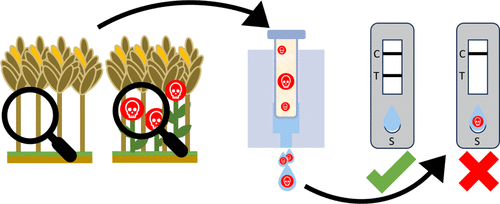Innovation in food safety! As part of the Horizon Europe project FoodSafeR, we’re proud to highlight a significant scientific contribution from our partner Wageningen University & Research.
Researcher Ids Lemmink, along with a multidisciplinary team, has developed a low-cost paper-based biosensor for the rapid detection of tropane alkaloids in plant-derived food products. This novel technology has just been published in one of the leading journals in the field: Analytical Chemistry.
The core innovation lies in the newly introduced technique called paper-immobilized liquid-phase microextraction (PI-LPME). This method enables both purification and concentration of the analyte directly at the point of need, providing a powerful tool for field testing—fast, efficient, and affordable. A practical solution for early on-site screening of natural toxins, helping protect public health and food supply chains.
Tropane alkaloids, such as scopolamine and atropine, are toxic compounds found in certain plants like Datura spp. When these weeds contaminate food crops, undetected residues can pose serious risks to consumers. Early detection is essential—and this biosensor makes it much more accessible.
This achievement is the result of close collaboration within the FoodSafeR consortium, together with co-authors Gert Salentijn, Linda Willemsen, Erik Beij, Han Zuilhof, and Toine Bovee.
Curious to learn more? Read the full article published in Analytical Chemistry
📷 Visual overview of the detection concept
(Image credit: Ids Lemmink, Wageningen University & Research)

